

Featured Topic: Basic Facts Boot Camp
Students need lots of distributed practice to master basic facts. Games are a great way to incorporate this practice as students are highly motivated to play and because many games are easily differentiated to match the varied needs of learners in a class.
Plan to include regular game time sessions in your math schedule. Many schools already utilize a weekly Game Day where students play games while teachers meet with small groups of students to reteach important concepts/skills or to provide enrichment opportunities to challenge talented students. When well-planned, these Game Days are a win-win for teacher and students!
Enroll your students in Basic Facts Boot Camp for the remainder of the year, but make it fun! What we learn with pleasure, we never forget is inspiration for this initiative. It's an effective way to provide practice for students, as needed, to gain mastery of basic facts. It's also great classroom management at this time of the year, as Game Day can be used on those days when class members are missing for other activities or when a substitute covers the class. Once students know the games and the classroom procedures, they monitor themselves. These ideas and resources are offered to help you plan your own boot camp activities:
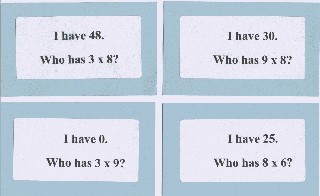
Who Has?
Begin or end regular classes with an appropriate Who Has? deck to practice basic facts. Time the class as they progress through the deck. Challenge students to improve their time each day. See  Who Has? Activities for instructions on using this resource and to download Who Has? decks to address different math concepts and operations.
Who Has? Activities for instructions on using this resource and to download Who Has? decks to address different math concepts and operations.
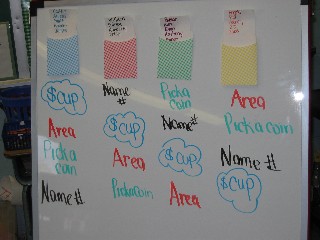
Math Game Day
Schedule 3-4 different games for this day. Create small groups and have them cycle through the games during the class period. Be sure to have all game boards and materials easily available for students to "grab and go." A work board, pictured to the left, that shows groups and the order in which groups will play the games is an effective classroom strategy for these game days as it builds student independence and responsibility. Students should already be familiar with all of the planned games. If a new game is introduced, make this a teacher station where you can introduce and monitor student understanding of the game rules. Follow this with an independent play station for the game. Check out the Mathwire  Math Games Collection for additional games to add to your Boot Camp collection.
Math Games Collection for additional games to add to your Boot Camp collection.
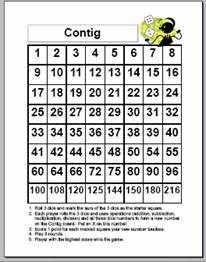
Class Play-offs and Tournaments
Spark extra motivation by establishing class play-offs or grade level tournaments of math games.  Contig, pictured at right, would make a great partner play-off game. The partner version encourages students to discuss and agree on the best option, increasing the likelihood that students actively consider many options before choosing their play. Students toss three dice, then use those three numbers and any operations to form a number on the game mat. Students score a point for their number plus extra points for each covered square their number touches. Students are motivated to consider many options in search of the most points for each play. You might need to use a timer to limit thinking time and reward students who have fact power, thereby encouraging all students to work on fact mastery. Class play-offs naturally extend to grade level tournaments and are a great end-of-the year math activity for math-letes.
Contig, pictured at right, would make a great partner play-off game. The partner version encourages students to discuss and agree on the best option, increasing the likelihood that students actively consider many options before choosing their play. Students toss three dice, then use those three numbers and any operations to form a number on the game mat. Students score a point for their number plus extra points for each covered square their number touches. Students are motivated to consider many options in search of the most points for each play. You might need to use a timer to limit thinking time and reward students who have fact power, thereby encouraging all students to work on fact mastery. Class play-offs naturally extend to grade level tournaments and are a great end-of-the year math activity for math-letes.
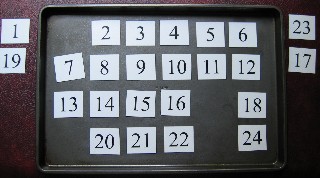
 Factor Blaster, pictured at left, provides excellent multiplication facts practice as students must know all facts for a number to successfully choose their best points option for play. The first student selects any number from the board and gets that many points. The opponent gets to remove all factors of the selected number that are still on the board and gets points equal to the sum of these factors, so students learn to choose wisely to limit their opponent's point gain. An added benefit of Factor Blaster, as opposed to Factor Game, is that students learn and capitalize on the prime numbers as these yield the most points and limit their opponent's scoring of factors. Use the suggested cookie sheet option for an easily stored classroom game.
Factor Blaster, pictured at left, provides excellent multiplication facts practice as students must know all facts for a number to successfully choose their best points option for play. The first student selects any number from the board and gets that many points. The opponent gets to remove all factors of the selected number that are still on the board and gets points equal to the sum of these factors, so students learn to choose wisely to limit their opponent's point gain. An added benefit of Factor Blaster, as opposed to Factor Game, is that students learn and capitalize on the prime numbers as these yield the most points and limit their opponent's scoring of factors. Use the suggested cookie sheet option for an easily stored classroom game.
NCTM's  Factor Game and
Factor Game and  Product Game provide great multiplication facts practice as well. Students may play the online versions to learn and practice the game. Create classroom mat boards for these games and store them in the classroom game center for easy use.
Product Game provide great multiplication facts practice as well. Students may play the online versions to learn and practice the game. Create classroom mat boards for these games and store them in the classroom game center for easy use.
The Everyday Mathematics game,  Name That Number provides mixed facts practice that is easily differentiated from addition/subtraction to multiplication/division to all operations. Students may practice the online version of
Name That Number provides mixed facts practice that is easily differentiated from addition/subtraction to multiplication/division to all operations. Students may practice the online version of  Name That Number to practice addition/subtraction facts in preparation for the class play-offs.
Name That Number to practice addition/subtraction facts in preparation for the class play-offs.
More Basic Facts Fluency
Every math teacher struggles to find ways to encourage students to master their basic facts. Whether for addition and subtraction facts or for multiplication and division facts, teachers collect many ideas from which they can draw activities to meet the varied needs of learners in their classes. Games and Who Has? activities are especially motivational and continual play can help students develop fact fluency in an effort to master the games and capture the most points.
Establish a math games section in the classroom so that students can easily locate materials for play. Some teachers establish take-home packs that students bring home to play with parents. Other teachers make games available during before/after school care or tutoring sessions to provide additional practice for students.
Read more about helping students develop  Basic Facts Fluency.
Basic Facts Fluency.
Find  Basic Facts Links to help students practice basic facts online.
Basic Facts Links to help students practice basic facts online.

Math Manipulatives Series: Investigating Dominoes
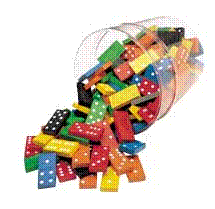
The second installment of this series is now online. Math Manipulatives: Investigating Dominoes is a one-stop resource for dominoes that includes games, math-literature connections, problem solving, templates and links to additional online resources to help students use dominoes to develop number sense. Be sure to check out the Domino Fun section at the bottom of this page to view some amazing Domino Art and to master a domino trick that will astound your students!
- View the
 Investigating Dominoes collection.
Investigating Dominoes collection.
- View the
 Investigating Tangrams collection.
Investigating Tangrams collection.

Recent Additions to Mathwire.com
Check the  New on Mathwire.com webpage to see what's new on the site this month.
New on Mathwire.com webpage to see what's new on the site this month.
Check the  Recent Additions to Mathwire.com webpage to see the most recent additions to the site this month.
Recent Additions to Mathwire.com webpage to see the most recent additions to the site this month.
Enter your email address below to receive notifications when new content is added to Mathwire.
NOTICE: If you have already subscribed to the Mathwire.com Updates but have not been receiving any notices, this may be due to your school's e-mail system that does not allow these mailings to be delivered. Please feel free to resubscribe using a different e-mail account rather than your school account.
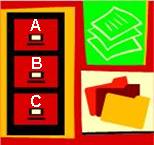
Mathwire Search Options
New to Mathwire.com? There are several ways to search the site for activities by Math Standard, Math Topic, or using an alphabetical search.
- See
 Searching the Mathwire.com Site for a thorough explanation of these search options.
Searching the Mathwire.com Site for a thorough explanation of these search options.
About Mathwire.com
Mathwire.com is designed to provide activities and appropriate worksheets for teachers to use in their classrooms. All activities and worksheets support the constructivist approach to learning mathematics and the NCTM Standards.
Activities: The activities on this site were developed by Terry Kawas and the teachers in districts where she has worked as a math consultant and coach or with students she has taught in college math-methods courses. The activities are classroom-tested by teachers and appropriate modifications have been made to reflect this field-testing. These activities are posted online in an effort to share quality activities and routines within the mathematics community.
Terms of Use: Teachers are welcome to download any of the activities for free use in their classrooms. No activities may be copied for use on other websites or included in commercial products without permission in writing from Terry Kawas, webmaster. Contact Terry Kawas
